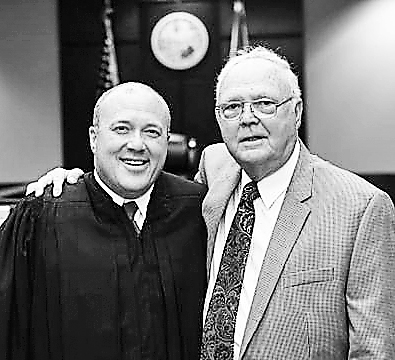Doubting Thomas and the Pledge of Allegiance
Q. Judge Smith, after watching the U.S. Supreme Court confirmation hearings, I’m curious why each state, regardless of its population, has two U.S. Senators? In a democracy, does that not give smaller states an unfair advantage?
A. Your questions are hot topics of discussion since the recent confirmation hearings, and you are not the only person to express doubts. Let’s look to civics and history for context.
Do you remember the line in the Pledge of Allegiance that says, “…and to the Republic for which it stands…?” Contrary to popular belief, the United States of America is a republic, not a democracy. Through democratic elections, we choose representatives and senators to decide political issues and set policy for us.
Before the constitution was ratified, each state was sovereign and jealously guarded its independence. Understandably, less-populated states feared their sovereignty would be overtaken by the more-populated states if representation in Congress was based solely on population. Likewise, more-populated states feared their sovereignty would be unfairly diluted unless representation in Congress was based solely on population. The solution was a bicameral Congress that addressed both concerns.
In the House of Representatives, seats are apportioned based on population, with each state being guaranteed at least one seat. In the Senate, each state gets two senators regardless of its population. This combination is fair because it balances out disparities, and legislation must pass in both houses.
As an example, let’s compare the most-populated state to the least-populated state. California and Wyoming each have two Senators and possess equal strength in the Senate. In contrast, California has 53 seats and Wyoming has one seat in the House of Representatives.
To provide some perspective, California has more seats in the House of Representatives than these 21 states combined:
Alaska, Arkansas, Delaware, Hawaii, Idaho, Iowa, Kansas, Maine, Mississippi, Montana, Nebraska, New Hampshire, New Mexico, North Dakota, Oklahoma, Rhode Island, South Dakota, Utah, Vermont, West Virginia, and Wyoming.
Because the Senate confirms judges, every state has an equal say. If instead, the House of Representatives had the authority to confirm judges, the most-populated states would decide the federal judgeships for everyone else. Rest assured that Wyoming doesn’t want California dictating who its federal district judges are going to be. I hope this helps.
The Honorable J. Layne Smith is a Circuit Judge, bestselling author, and public speaker. Send your questions to askjudgesmith@gmail.com.



